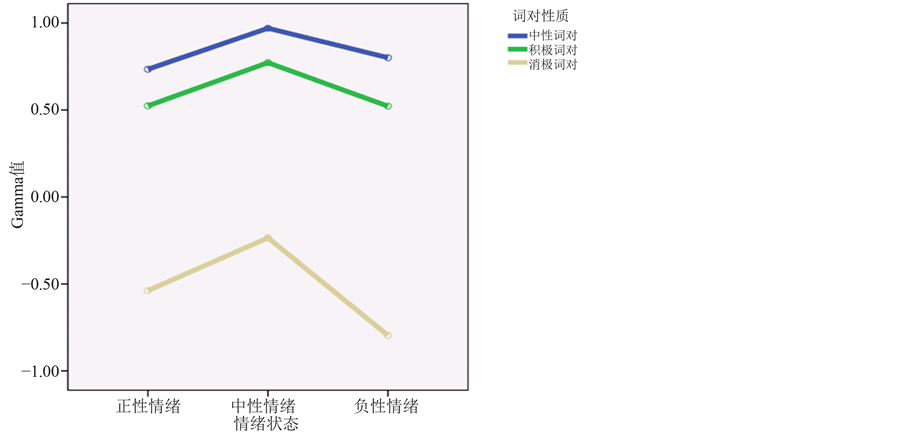1. 引言
知晓感(Feeling-of-knowing,简称FOK)是指人们确信某种信息能够从记忆中提取出来,但目前无法提取的一种心理状态,这种心理状态发生于记忆提取失败之后;FOK判断是元记忆监测中最重要、最具代表性也是目前研究者重点关注的一种监测性判断(Barrett, Gross, Christensen, & Benvenuto, 2001; Koriat, 1993;陈功香,张承芬,2007)。研究表明,FOK判断主要受到任务、策略和个体三个方面因素的影响(Nelson, Gerler, & Narens, 1984)。作为FOK判断的三大影响因素之一的个体变量一直是FOK研究者们的有关焦点(Zelinski, Gilewski, & Anthony-Bergstone, 1990;白学军等,2006;施建农,1990;张萌,张积家,张全信,2000)。然而,在FOK的研究中对于个体变量的研究多集中于个体的人格和动机方面,而对于个体情绪和情绪调节的研究比较匮乏。
在讨论情绪对元记忆监测的影响之前,需区分以下两种情况:一种情况是,诱发情绪的刺激就是人们学习记忆的对象,这种情况下主要探讨的是人们对这种情绪性材料的学习记忆与非情绪性材料之间的差异;另一种情况是,唤起情绪的刺激并非学习记忆的对象,研究者关心的是作为影响源的情绪唤醒在学习记忆中发挥怎样的作用。后者称为情绪启动效应(affective priming effect),所谓情绪启动效应指的是个体先行加工具有一定情绪意义的刺激后,后继加工也容易带上相应的情绪色彩,其研究的主要目的是考察个体处于某种情绪色彩的状态下其认知与元认知的相关表现。通过查阅文献,发现有关情绪诱发启动与元记忆监测关系的研究近几年来已经逐渐受到研究者们的重视,在元认知的各分支领域均有所涉及,归根到底绝大部分是研究正、负性情绪对学习判断(Judgement-of-Learning,简称JOL)的影响(Artino Jr. & Jones II, 2012)。Zimmerman等于2010年的一项研究结果发现,在线索回忆条件下,被试对负性情绪词对给出了更高的JOL判断;在自由回忆条件下,被试对于负性情绪词对的判断做出了过高的估计(Zimmerman & Kelley, 2010)。Dunlosky等人(2012)同样发现年轻被试在对正负性情绪材料的JOL上具有较高的敏感性,也就是说相比于中性材料,对带有情绪色彩的材料JOL判断等级显著要高(Tauber & Dunlosky, 2012)。然而,在FOK的研究领域中,以词对为学习材料进行情绪性质与词对情绪色彩对FOK影响的研究目前尚未发现,因此本研究中的实验一就是以此作为出发点,主要考察被试在不同的情绪诱发条件下对带有不同情绪色彩的词对所做的FOK判断究竟会有哪些不同。
有关情绪调节与元认知之间关系的研究相对较少。王婷婷(2012)研究了不同效价的情绪唤醒对元记忆监测的影响,结果发现正性情绪提高学习判断等级,负性情绪降低学习判断等级,表明正性情绪下的元记忆监测好于负性情绪。正、负性情绪下,不同的情绪调节策略显著地影响着学习判断等级和学习判断的准确性。在正性情绪条件下,对于学习判断等级,评价重视和表达宣泄策略组显著高于评价忽视和表达抑制策略组,而学习判断准确性则与此相反。在负性情绪条件下,评价忽视策略的学习判断等级最高,其次是表达抑制策略,评价重视策略和表达宣泄策略最低。
根据前人的研究结果,情绪状态与情绪调节对于个体认知存在着一定的影响。既然情绪调节会消耗一定的认知资源,对记忆产生影响,那么对元记忆也有可能受到影响。元记忆是一种对记忆的认识、评估和监测过程,在这个过程中必然也会耗费一定的认知资源,因此情绪调节对认知资源的占用也可能会影响到元记忆的工作效率。通过查阅文献发现目前在这方面的研究还较少。关于情绪调节策略,认知重评和表达抑制被认为是两种非常重要且有效的状态性情绪调节策略,尤其认知重评是一种通过对状态、过程和情景性情绪的调节达到缓解不良情绪发生的重要方法和技术。这些情绪调节策略与元认知领域的知晓感的相关研究还比较少。以Gross的情绪调节模型以及情绪调节对认知的过程模型为理论依据(Gross, 2011),在实验一的基础上,实验二只激发被试的负性情绪体验,材料为中性词对,引入四种不同的情绪调节策略,旨在考察在负性情绪条件下不同的情绪调节策略对FOK判断的影。
2. 实验一
2.1. 目的及假设
实验一的研究目的是考察不同情绪状态和不同情绪性质词对的FOK判断值、回忆成绩、再认成绩以及FOK判断准确性的影响。基于实验目的,提出如下假设:1) 情绪状态在FOK判断上的主效应显著,即与正性、负性情绪状态相比,中性情绪诱发条件下词对的整体FOK判断等级和判断准确性更高;2) 词对的情绪性质在FOK判断上的主效应显著,即与积极、消极情绪词对相比,中性词对的FOK判断等级和判断准确性更高;3) 不同情绪状态与不同情绪性质的词对之间的FOK判断等级与准确性不存在交互作用。
2.2. 方法
2.2.1. 被试
大学本科一年级学生共100名,男女均衡,平均年龄为18.4岁。所有被试均未参加过类似实验,均为右利手,具备基本的电脑操作能力。
2.2.2. 研究设计
实验一采取3(情绪状态) × 3(情绪词对)的混合设计:自变量为不同情绪诱发组(正性、中性、负性)和不同情绪性质词对(积极、中性、消极),其中,情绪状态为被试间变量,情绪词对为被试内变量;因变量为FOK判断等级、回忆成绩、再认成绩和FOK相对准确性(Gamma值)。
2.2.3. 实验材料
本研究中的情绪状态使用电影片段诱发法,大量的研究表明电影片段通常能够诱发出被试强烈的情绪体验,被认为是最为有效的情绪诱发方法之一(Eldar, Ganor, Admon, Bleich, & Hendler, 2007; Gilet, 2008;李建平,张平,代景华,王丽芳,阎克乐,2006),特别适合于笼统的以积极或消极情绪为考察对象的研究。其中在实验一中由《憨豆先生》片段(3分58秒)诱发正性情绪,《生命脉动》片段(2分50秒)诱发中性情绪,《南京大屠杀》片段(3分22秒)诱发负性情绪,在正式实验之前,每组情绪诱发视频均截取三组,然后通过十位前测被试加以评定,选出符合度最高、诱发情绪效果最好的三组视频。每个情绪诱发组中共有36对配对词对,左边为线索词,右边为目标词。其中每组三种不同性质的词对各12对,随机呈现。
实验中的中性词对选自宿淑华(2004)的研究当例中;情绪词对选自钟杰等人编制的《中文情绪形容词检测表》,经过Amos分析,信效度较好(如:欢欣–快活)。在再认阶段除目标项目之外,另外三个备选项目均为陌生词对,且其情绪性质与目标项目保持一致,从而最大限度的排除了额外变量对实验的影响。
2.2.4. 实验过程
实验流程包括情绪评定及学习–回忆–判断–再认四个阶段。
1) 由于实验中涉及到的情绪状态是一个关键的自变量,其主观性较强,因此在实验正式开始之前对被试进行情绪评定,以此作为情绪的基线数据,诱发情绪的视频播放之后让被试进行同样的情绪评定,以考察情绪诱发是否有效。
2) 学习阶段:一共学习40对词对,其中每种情绪性质的词对各12对,其余4对为干扰词对,以避免出现首因、近因效应。除干扰词对设定学习顺序之外,剩下36对学习词对随机呈现。
3) 回忆阶段:电脑屏幕上给出每对词对的线索词(如手表——?),要求被试在答题纸上的对应位置写出刚刚学习过的目标词,无法回忆的跳过。
4) 判断阶段:要求被试对所有词对进行FOK判断,即判断在稍后的再认测验中能否在四个选项中选出正确的目标词,以0%,20%,40%,60%,80%,100%为判断指标。
5) 再认阶段:以单项选择的形式出现,呈现线索词和四个选项(其中一个是目标词,另外三个是陌生词),要求被试进行单项选择。所有词对再认结束后,被试需对当前的情绪再进行一次评定,以考察整个实验过程中情绪保持是否有效。
2.3. 数据处理
收集的原始数据包括实验前、视频播放后以及实验结束时三组情绪评定等级、回忆成绩、FOK判断值和再认成绩(各组收集到的有效数据分别为:正性情绪诱发组和中性情绪诱发组各28位,负性情绪诱发组27位),进一步将被试未正确回忆出来的项目的FOK判断值和再认成绩进行Gamma相关计算得出相对准确性。实验数据使用SPSS进行统计分析,主要进行描述统计、因素方差分析及多重比较。
2.4. 结果与分析
2.4.1. 情绪诱发效果
结果表明,在观看视频前后,积极情绪组被试在愉快和兴奋两个维度的得分差异显著F(1, 26) = 79.955, p < 0.01; F(1, 26) = 77.614, p < 0.01,在悲伤和难过两个维度诱发前后无显著差异F(1, 26) = 0.950, p > 0.05;F(1, 26) = 1.865, p > 0.05。中性情绪组被试在愉快、悲伤、兴奋和难过四个情绪维度上均没有引起显著变化,而且各项情绪指标均维持在平稳的中性水平上。消极情绪组被试经情绪主观报告发现,在悲伤和难过两个维度上数据呈显著差异,观看视频之后悲伤和难过指数显著高于观看视频之前F(1, 25) = 53.091, p < 0.01; F(1, 25) = 55.519, p < 0.01。各种实验条件下,实验结束后的情绪测验的结果与诱发得到的结果差异不显著,这说明,在实验中不仅成功诱发了情绪,而且持续了整个实验过程。因此,实验中情绪的诱发是有效的。
2.4.2. FOK值
FOK值数据分析主要从每组情绪状态下被试对所有项目词对做出的判断以及被试对不同的情绪性质词对所做的FOK判断这两个方面着手分析。
由表1可以看出,在FOK判断值上,情绪状态主效应显著;词对性质主效应显著;两者之间的交互作用不显著。通过事后LSD多重比较发现,在情绪状态方面,中性情绪诱发组的FOK判断值显著高于负性情绪诱发组(p = 0.000 < 0.001)和正性情绪诱发组(p = 0.044 < 0.05),而正性情绪诱发组与负性情绪诱发组之间差异不显著(p = 0.114 > 0.05);在情绪性质方面,中性词对的FOK高于正性词对(p = 0.000 < 0.001),正性词对高于负性词对(p = 0.000 < 0.001)。
2.4.3. 回忆和再认成绩
对三组情绪条件下被试的回忆成绩和再认成绩进行分析,描述统计述统计结果如表2所示,中性情绪诱发组被试的回忆成绩和再认成绩高于另外两组。进一步对数据做方差分析,结果见表3。
由表3可以看出,中性情绪诱发组的回忆成绩显著好于正性情绪诱发组和负性情绪诱发组,而再认成绩三组之间没有显著性差异,说明不同的情绪状态对于被试的再认成绩影响不显著,即内隐的学习效果尚未受到情绪的影响。

Table 1. ANOVA on feeling-of-knowing
表1. FOK判断值的方差分析
注:*p < 0.05,**p < 0.01,***p < 0.001。

Table 2. Subjects’ recalled results and recognition results under three kinds of emotional states
表2. 三种情绪状态下被试的回忆成绩和再认成绩

Table 3. ANOVA on subject’s recalled result and recognition result in three kinds of emotional condition
表3. 三种情绪条件下被试回忆成绩与再认成绩的方差分析
注:*p < 0.05,**p < 0.001。
2.4.4. FOK准确性(Gamma值)
在本研究中探讨的是FOK判断的相对准确性,具体的算法是通过计算未正确回忆项目的FOK判断值与其再认成绩之间的Gamma相关,方差分析结果如表4所示。
分析结果表明,如表4,在Gamma指标上,情绪状态主效应显著,词对性质主效应显著,情绪状态和词对性质的交互作用不显著。
通过两两比较发现(图1),在FOK判断的准确性指标上,在情绪状态方面,中性情绪诱发组显著高于负性情绪诱发组(p = 0.000 < 0.001)和正性情绪诱发组(p = 0.000 < 0.001),正性情绪诱发组与负性情绪诱发组之间无显著差异(p = 0.27 > 0.05);在词对性质方面,中性词对显著高于积极词对(p = 0.000),积极词对显著高于消极词对(p = 0.000)。
2.5. 讨论
实验一首先探讨了个体的情绪状态对FOK判断等级及其准确性的影响。结果发现,情绪状态的主效应显著,即中性情绪诱发组的FOK判断等级和判断准确性显著高于正、负性情绪诱发组,这与前人研究的结果基本一致。这是因为与正性情绪和负性情绪的诱发相比,处于中性情绪组的被试与日常生活中的恒常情绪更为接近,诱发后的情绪体验相较于正性情绪和负性情绪更加平和与自然,因此被试由情绪诱

Table 4. ANOVA on Gamma value
表4. Gamma值的方差分析
注:*p < 0.05,**p < 0.01,***p < 0.001。

Figure 1. Gamma value on different word pairs under three different kinds of emotional states
图1. 三种不同情绪状态下不同性质词对的Gamma值
发所占用的心理资源相对较少,在进行FOK判断时更加理性与客观,对自己也更为自信,因此出现实验结果中中性情绪条件下被试的FOK判断等级显著高于另外两种情绪条件。
3. 实验二
3.1. 目的和假设
在实验一结果的基础上,以负性情绪为实验的诱发条件,重点考察在负性情绪状态下四种不同的情绪调节策略对FOK判断等级和判断准确性产生的影响。基于实验目的,提出如下假设:1) 评价忽视和表情宣泄两种调节策略下的FOK判断等级高于另外两种调节策略;而评价忽视和表情宣泄相比,评价忽视的判断等级高于表情宣泄;2) 作为先行关注调节的评价重视和评价忽视两种调节策略下的FOK判断准确性高于反应关注调节的两种策略。
3.2. 研究方法
3.2.1. 被试
大学本科一年级学生共120名,男女均衡,平均年龄为18.7岁。所有被试均未参加过类似实验,均为右利手,具备基本的电脑操作能力。回收101个被试的有效数据,其中重视组25个、忽视组30个、宣泄组21、抑制组25个。
3.2.2. 实验设计
实验二均在负性情绪条件下进行,35对词对均为中性。采用单因素被试间设计,自变量为不同的情绪调节策略,有四个水平(评价重视、评价忽视、表情宣泄、表情抑制),因变量为回忆成绩、再认成绩、FOK判断等级和判断准确性(Gamma值)。
3.2.3. 实验材料
实验二中的情绪诱发材料选取实验一中的消极情绪诱发材料《南京大屠杀》片段;学习材料为实验一中的35对中性词对。
3.2.4. 实验过程
本实验采用E-prime编程,实验过程与实验一基本相同,在诱发消极情绪之后插入一个情绪调节策略指导环节。本实验采用的是通过指导语的引导使得被试在当前的环境中采用研究所需要的情绪调节策略,具体操作如下(Gross & Thompson, 2007;卢家楣,孙俊才,刘伟,2008):
评价重视组:接下来您将看到一段影片,请您认真地观看,并尽可能地让自己身临其境,想象这些事件是发生在你自己身上,并且请充分地感受影片中所表达的情绪。
评价忽视组:接下来您将看到一段影片,请您认真地观看,并且保持客观、理性的态度来看待影片,暗示自己这只是电影技术而已,尽最大的努力让自己忽视影片中的情绪。